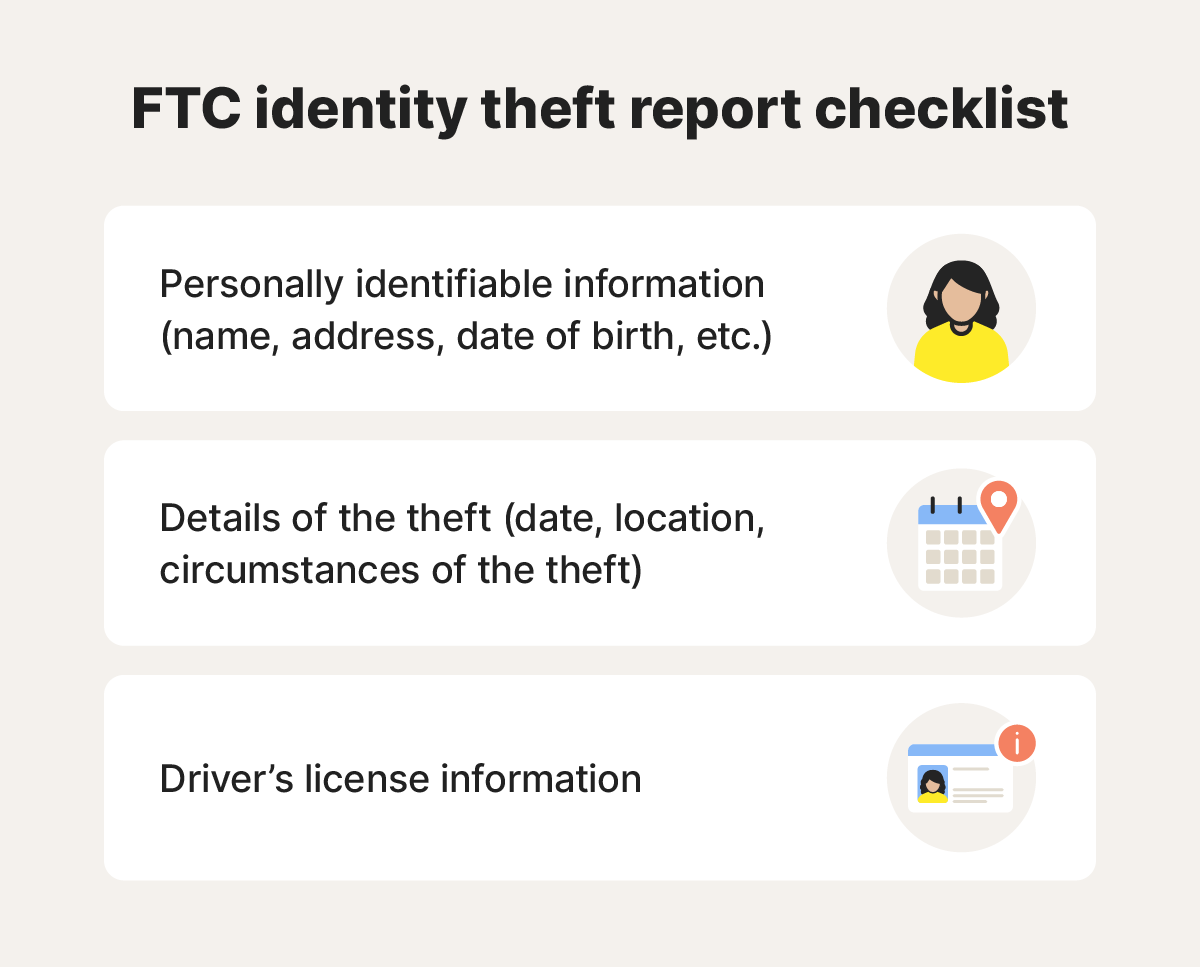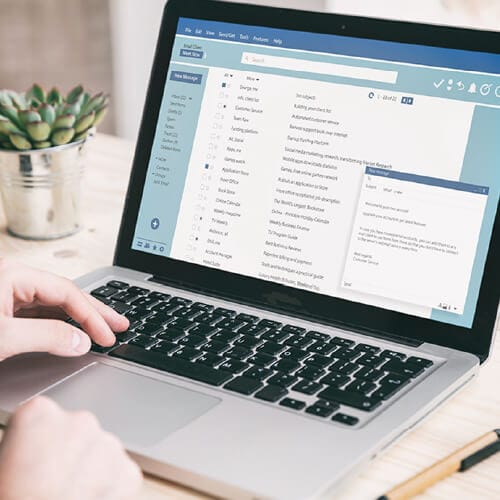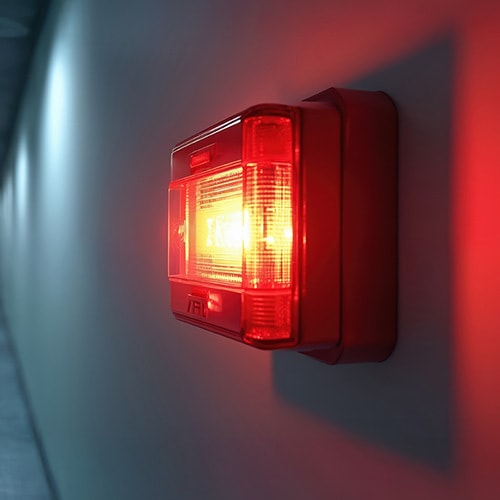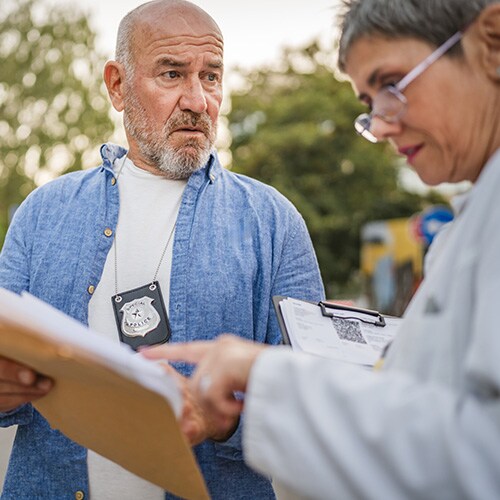“My license was stolen …The thief then used my license to get a car registered and insured under my name …The person who stole my identity got in[to] a [hit-and-run] accident. State troopers came looking for ME.” - Reddit user
Your driver’s license number, a string of alphanumeric identifiers, is totally unique to you, making it a valuable piece of personally identifiable information (PII). Criminals are all too aware of this, and 25% of data breaches in the first six months of 2024 involved driver’s license data. Read on to learn more about what criminals can do with your license number and how to protect yourself.
But if your number has already been compromised, here’s what you need to do:
1. File a police report
Contact your police department’s non-emergency line to report the stolen driver’s license or misuse of your information. Officers can then open an investigation into the incident.
Provide as much evidence as possible when submitting your police report. Include the last time you used your license, false charges on your motor vehicle report (MVR), and any account takeover or identity theft attempts.
2. Report it to the DMV
Report your driver’s license as stolen or the misuse of your number to your state’s Department of Motor Vehicles (DMV). You can find your local DMV through the state motor vehicle services website. Request a copy of your motor vehicle report (MVR) to check for suspicious activity and ask the DMV to place a flag or identity verification alert on your account.
You’ll also need to request a new card. If you believe your identity has been stolen, you may be able to request a new driver’s license number, but this varies by state — you’ll typically need a police report and proof of identity theft to get a new number. If you simply request a replacement card, your license number will usually stay the same.
3. Place a fraud alert or freeze your credit report
Placing a fraud alert or credit freeze on your credit report can help keep your credit safe from criminals using your driver’s license information — along with other stolen PII — to open new accounts in your name.
A fraud alert notifies creditors that they need to verify your identity before issuing credit, while a credit freeze blocks access to all new applications.
You can place a credit freeze on top of a fraud alert for extra security, which means you’ll be notified of credit application attempts while also blocking them. Plus, if you need to temporarily unfreeze your credit, you’ll still have the protection fraud alerts provide.
Below is the contact information for freezing your credit with all three credit bureaus. For a fraud alert, you only need to contact one bureau; they will inform the others themselves.
Credit bureau |
Phone number |
|---|---|
1-888-298-0045 |
|
1-888-397-3742 |
|
1-800-916-8800 |
4. File an identity theft report
After protecting your credit accounts, file an identity theft report with the Federal Trade Commission (FTC). Reporting it to the FTC will provide you with resources for identity theft recovery specific to your situation.
To file an identity theft report about your driver’s license with the FTC, submit information about the incident online or call them at 1-877-382-4357.


5. Perform a background check on yourself
Perform a criminal background check on yourself to uncover whether fraudsters have misused your identity through your driver’s license number. If you spot any inaccurate information, dispute it using supporting evidence, like the FTC and police reports.
One option is to request an Identity History Summary Check, or a rap sheet, from the FBI. You’ll need to pay a small fee, but it will let you review and potentially challenge your personal record. Alternatively, you can request similar information from your local sheriff’s office or police department to track localized incidents, often at no cost.
6. Check for mail forwarding requests
Scammers with your address could forward mail to a location they control using your driver’s license information. If you suspect a scammer has your address and is committing mail fraud, report the incident to the United States Postal Inspection Service (USPIS).
You can also use an identity theft protection service like LifeLock to help identify and notify you of address change requests linked to your identity made to the United States Postal Service (USPS). We also monitor for fraudulent use of your name, Social Security number, or date of birth in applications for credit and services.
7. Scan the dark web
Scanning the dark web can reveal whether cybercriminals are selling personal information, like your driver’s license number, on the dark web. If your data is on the dark web, multiple cybercriminals could gain access to it, potentially leading to criminal identity theft or other fraudulent activity in your name.
Get LifeLock to patrol the dark web for you — we’ll notify you if we find your information. While you can’t typically get your information taken down from the dark web, you can act to secure impacted accounts and information to help protect against identity theft.
8. Monitor your credit report
Credit monitoring will tell you if criminals use your driver’s license information to obtain new credit accounts. Even if you’ve taken steps to protect your credit and get your license back, monitoring is useful over time, informing you if you’ve become a long-term target.
You can get an online credit report from AnnualCreditReport. Look for any credit accounts you don’t recognize and make sure you dispute them as soon as possible, so any discrepancies don’t damage your finances and credit score.
What can someone do with your driver’s license number?
If someone has just your driver’s license number, they probably can’t do much. But, if they also know your address, name, and other personally identifiable information (PII), they could do a whole lot more — even steal your identity.
Here’s what a criminal could do with your license number:
- Open financial accounts: Scammers can use your license number, along with other personal information, to open financial accounts in your name, such as bank accounts, credit card accounts, or loans.
- Create fake IDs: Criminals can use your number to create a fake ID. For example, one Reddit user shared how someone created a fake driver’s license using their number and details and used it to buy gun parts. They could also use a fake ID to avoid traffic fines.
- Sell it on the dark web: Cybercriminals might sell your number on the dark web to other criminals.
- Create a synthetic identity: Scammers can blend your information with fake details to create new, synthetic identities.
- Steal your mail: Thieves can fill out a form and redirect your mail to an address where they can steal it. They could commit fraud if they intercept financial documents and other important mail. Use identity theft protection like LifeLock, which will notify you if a change of address in your name is registered with the USPS.


The consequences of identity theft when someone steals your license number can be grave, so learn how to protect your number before the worst happens.
How to protect your driver’s license number
You can protect your driver’s license and number by using a secure wallet, paying attention to your surroundings, and limiting where you share your information. You should also sign up for dark web monitoring and pay attention to data breaches to help protect information on your license.
Here are some more detailed tips on protecting your driver’s license number:
- Keep your wallet close: Never leave your wallet in an open, unattended area. Always keep your wallet close by, either on you or in a zipped bag.
- Pay attention to your surroundings: Even when your wallet is in a safe place, pay attention to people around you and your surroundings.
- Get an RFID-blocking wallet: RFID skimmers can steal information from RFID-enabled driver’s licenses. States with enhanced licenses with an RFID chip include Michigan, Minnesota, New York, Vermont, and Washington.
- Limit information sharing: Avoid sharing your driver’s license information unless required. The fewer places you share this information, the less likely it is to be compromised in a data breach or leak.
- Sign up for dark web monitoring: Dark web monitoring tools can alert you if they detect your driver’s license number on the dark web, so you can take action by reporting it and securing your accounts.
Protect yourself from driver’s license identity theft
The theft of your driver’s license number and other PII can lead to accounts opened in your name, stolen government benefits, and years of recovery.
Get LifeLock to help keep your information safer online. You’ll also get stolen wallet protection for your physical license and access to identity theft recovery professionals, who can support you if somebody misuses your information.
FAQs
Can someone steal your identity with your driver’s license number alone?
If a criminal only knows your license number, they probably can’t steal your identity. But if they have your driver’s license number and other personal information, they could steal your identity.
Is giving out your driver’s license number safe?
Sharing your driver’s license number is safe in certain situations, but it’s important to consider whom you’re giving it to and why. Only provide it when absolutely necessary to minimize potential risks.
Can you change your stolen driver’s license number?
It depends on the situation and your state’s DMV office. Many will allow you to change your number in extreme circumstances, such as identity theft.
How do you check if someone is using your identity?
You can check if someone is using your identity by reviewing your criminal background check, credit report, and financial statements. This will reveal any fraudulent criminal or financial activity in your name.
What can people do with your license plate number?
People can’t do much with only your license plate number. But if a fraudster knows this info, along with other personal details like your email, they could use it to create tailored phishing and smishing attacks.
Editor’s note: Our articles provide educational information. LifeLock offerings may not cover or protect against every type of crime, fraud, or threat we write about.
This article contains
- 1. File a police report
- 2. Report it to the DMV
- 3. Place a fraud alert or freeze your credit report
- 4. File an identity theft report
- 5. Perform a background check on yourself
- 6. Check for mail forwarding requests
- 7. Scan the dark web
- 8. Monitor your credit report
- What can someone do with your driver’s license number?
- How to protect your driver’s license number
- Protect yourself from driver’s license identity theft
- FAQs
Start your protection,
enroll in minutes.
LifeLock is part of Gen – a global company with a family of trusted brands.
Copyright © 2026 Gen Digital Inc. All rights reserved. Gen trademarks or registered trademarks are property of Gen Digital Inc. or its affiliates. Firefox is a trademark of Mozilla Foundation. Android, Google Chrome, Google Play and the Google Play logo are trademarks of Google, LLC. Mac, iPhone, iPad, Apple and the Apple logo are trademarks of Apple Inc., registered in the U.S. and other countries. App Store is a service mark of Apple Inc. Alexa and all related logos are trademarks of Amazon.com, Inc. or its affiliates. Microsoft and the Window logo are trademarks of Microsoft Corporation in the U.S. and other countries. The Android robot is reproduced or modified from work created and shared by Google and used according to terms described in the Creative Commons 3.0 Attribution License. Other names may be trademarks of their respective owners.








